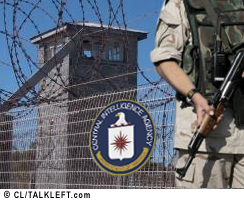In the week before his arrival, Jabour said, Pakistani intelligence officers had beaten, abused and burned him at a jailhouse in Lahore, where he was arrested. There two female American interrogators also questioned him and told him he would be rich if he cooperated and would vanish for life if he refused. He said he was later blindfolded and driven four hours north to the villa in a wealthy residential neighborhood.
The house in Islamabad, which U.S. intelligence officials say was jointly run by the CIA and Pakistani intelligence, had been outfitted with jail cells. When Jabour arrived, he saw as many as 20 other detainees, including the 16-year-old son of an Egyptian sheik, who had been captured in Pakistan. Dozens of al-Qaeda suspects swept up in the years after Sept. 11, 2001, have been through the house, according to accounts by former prisoners and U.S. intelligence officials with knowledge of the facility.
Jabour spent five weeks there, chained to a wall and prevented from sleeping more than a few hours at a time. He said he was beaten nightly by Pakistani guards after hours of questions from U.S. interrogators. Then he and others were whisked off to CIA-run sites. Some sites were in Eastern Europe; Jabour went to one in Afghanistan. Interrogators -- whom he described as Americans in their late 20s and early 30s -- told Jabour he would never see his three children again.
After his release, Jabour, a Palestinian, returned to his parents home in the Gaza strip.
Jabour acknowledged helping al-Qaeda and Taliban fighters who fled Afghanistan as the U.S. military hunted for the perpetrators of the Sept. 11 attacks....Using funds from al-Qaeda financiers, Jabour said, he arranged for food, medical treatment and travel documents for several dozen people and arranged for others, including two African men who fought for al-Qaeda, to slip out of Pakistan. He did not return to Afghanistan to fight, and he said he had no interest in attacking Americans.
Apparently, he was not believed to be a member of al-Qaida, just someone who was helping them in Afghanistan. While the Administration believed him to be "a bad guy," it won't say why he was released.
Jabour was taken from the Villa to a CIA black site. He describes his treatment:
Daily interrogations were conducted by a variety of Americans. Over two years, Jabour said he encountered about 45 interrogators, plus medical staff and psychologists. He was threatened with physical abuse but was never beaten.
Once, he was shown a small wooden crate his interrogators called a "dog box" and was told he would be put in it if he didn't cooperate. He was told that Khalid Sheik Mohammed, the suspected architect of the Sept. 11 attacks who was among the 14 moved to Guantanamo Bay last year, became cooperative after he had been put in the box. But Jabour said he was not subjected to the crate.
Jabour was eventually transferred to Jordanian and then Israeli custody.
The Israelis treated him better than his other captors, he said. They got Jabour his first lawyer, an Israeli Arab named Nizar Mahajna, who said in an interview that the Israelis had held Jabour in a prison near Haifa for two months. He was not mistreated, blindfolded or shackled, the lawyer said.
Israeli authorities had considered charging Jabour with fighting for an enemy of the Jewish state. But, Mahajna said, Jabour's training in Afghanistan had occurred more than eight years earlier, he was not a member of al-Qaeda and he had never lived in the Palestinian territories.
It was the Israelis who ultimately freed him.
The Israeli government dropped the case and transferred Jabour to Gaza. Prison guards drove him to the Erez border crossing between Israel and the Gaza Strip. "Good luck," one of them said to Jabour as he crossed into Gaza, where his parents awaited.
Harrowing story. How many of these men are there? President Bush needs to pony up the information. As HRW's Joanne Mariner says, :
Last September, President Bush announced that he had emptied out the CIA's prisons by sending 14 detainees to military custody at Guantanamo. He said nothing about what had happened to many other people who were believed to have been held by the CIA. By leaving their fate and whereabouts unknown, he displayed a callous disregard for their families, a contempt for human rights norms, and a blatant indifference to the moral standing of the United States.




